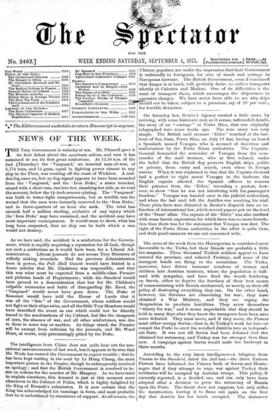On Saturday last, Reuter's Agency created a little scare, by
reviving, with some histrionic and, as it seems, unfounded details, the story of an " outrage " at Porto Rico, that was originally telegraphed here some weeks ago. The true story was very simple. The British mail steamer Eider' touched at the har- bour of San Juan, Porto Rico, on July 13 last, having on board a Spaniard, named Venegas, who is accused of desertion and malversation by the Porto Rican authorities. The Captain- General demanded the surrender of Venegas from the com- mander of the mail steamer, who at first refused, under the belief that the British flag protects English ships, public or private, from entry and search, even when in foreign waters. When it was explained to him that the Captain-General had a perfect to right arrest Venegas in the harbour, the English captain allowed the Spanish officers to remove their prisoner from the Eider,' recording a protest, how- ever, to show "that he was not interfering with his passenger's freedom." Venegas was handed over to the judicial authorities, and when the last mail left the Antilles was awaiting his trial. These plain facts were distorted in Reuter's dispatch into an in- fraction of international law, which several papers put on the level of the 'Trent' affair. The captain of the ' Eider' was also credited with some heroic expressions for which there was no more founda- tion than there was for the statement that Venegas- was shot. The right of the Porto Rican authorities in the affair is quite clear, and their good-manners we are not concerned with.






























